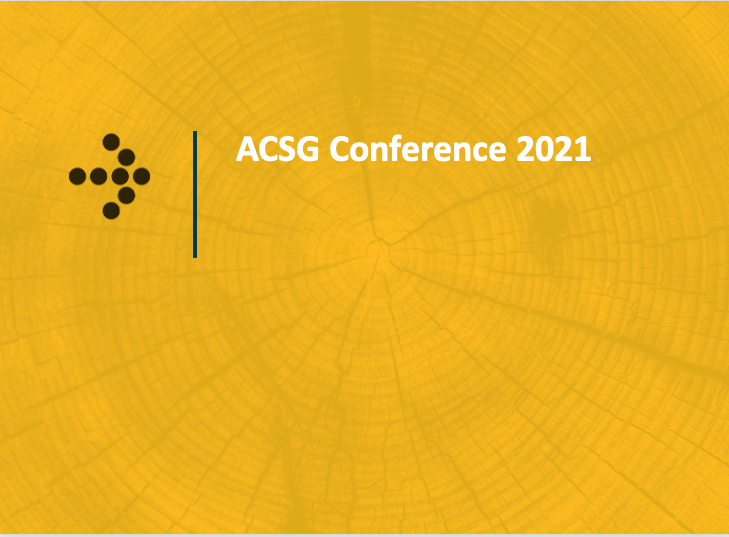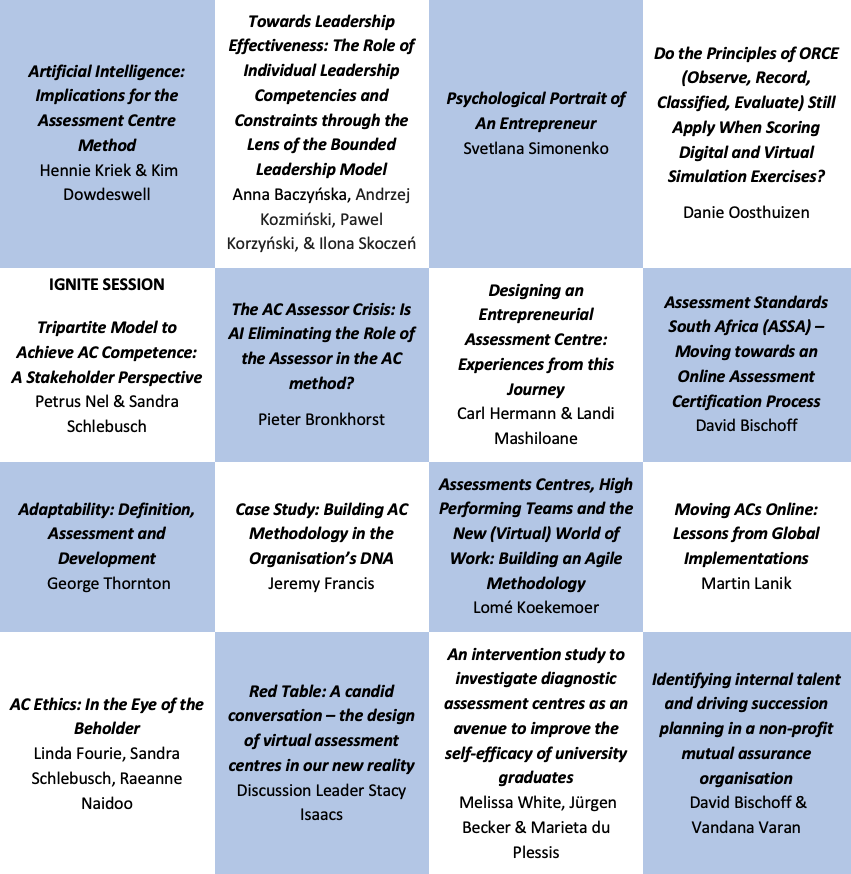ACSG Conference 2021

The annual Assessment Centre Study Group (ACSG) conference, which is normally hosted in Somerset West, will this year take place online due to the Covid-19 pandemic. The conference dates are 15 to 19 March 2021 with a host of exciting topics and presenters.
Evalex attends, presents at and is a regular sponsor at the conference on a yearly basis. This year, we are the main sponsor at the conference and we will also be sponsoring the Whova app, which is the platform on which the conference will be hosted. Evalex also has a number of presentations taking place this year:
Our Founder and Head of the OMT Group (consisting of OMT, Evalex and Odyssey), Dr Pieter Bronkhorst, will present on Thursday, 18 March at 13:30 with a topic entitled “The AC Assessor Crisis: Is Artificial Intelligence eliminating the role of the Assessor in the AC method?”
Furthermore, David Bischof, our Director for Business Development, will be conducting a joint client presentation entitled “Identifying internal talent and driving succession planning in a non-profit mutual assurance organisation”, which takes place on 19 March at 14:45.
David will also be representing Assessment Standards South Africa (ASSA) at the conference with a topic entitled “ASSA – Moving towards an online Assessment Certification Process”. This session takes place on 18 March at 14:45.
For more information see the communication below, which was put together by the ACSG:

The Assessment Centre Study Group (ACSG) is hosting its annual conference, this time as a virtual conference. This provides you with more options to obtain your CPD points from the Health Professions Council of South-Africa (HPCSA) since you can attend:
- All 4 pre-conference workshops (2 synchronous and 2 asynchronous)
- All 16 Open Space sessions (8 synchronous and 8 asynchronous)
- All conference events (except ACSG Academy Workshops) will be available to be accessed asynchronously for up to 2 months after the official conference dates, allowing you to attend when convenient to you (please register before the conference).
We have a jam-packed agenda for the full week, starting with the AC Academy Training Workshops (Monday, 15 and Tuesday, 16 March). The purpose of these 3 training programmes is to build world-class Assessment Centre competence. The modules are:
- Module 1: Introduction to Behaviour Observation during an Assessment Centre
- Module 2: The Design and Development of an Assessment Centre
- Module 3: The Design and Development of a Simulation
Wednesday, 17 March is the day on which the Pre-conference Workshops are presented. We have 4 must-attend workshops (they are each 4 hours long):
- Introduction to Assessment Centres (Sandra Schlebusch – AC Academy; LEMASA)
- Promoting Ethical Excellence in the Design and Operation of Assessment Centres (Henriëtte van den Berg – Private Practitioner, South Africa)
- Introduction to Development Centres (Petrus Nel, AC Academy; University of Johannesburg
- New Approaches in the Definition, Assessment and Development of Business Acumen and Strategy Execution: Critical Capabilities for Organisational Success as Seen Through the Lens of Organisations’ X Factors (Sandra Hartog & Lynn Collins, BTS, USA)
George C Thornton III: Practical Benefits from Psychological and Decision-making Theories (18 March 2021)
This presentation describes how several theories from social perception, psychometrics, and interpersonal judgment help us design, implement, and evaluate the assessment centre method. Various benefits from using theory are cited. For example, when there is no prior practice or no research has been done, theory guides us. Examples from theories are given and shown how they are useful. For example, Interactionist Theory informs us that behaviour is a function of the interaction of characteristics of both the person and situation. This provides guidance for competencies to assess and exercise design. Taxonomies of Competencies, the Realistic Accuracy Model and the Frame of Reference Models’ practical value are high-lighted. The presentation ends with examples of how theories can guide AC practitioners and scholars in how to launch truly promising beginnings.
George C. Thornton III is Professor Emeritus at Colorado State University, Fort Collins, Colorado, USA. He is a Diplomate in Industrial Psychology with the American Board of Psychology and a Fellow of the Society for Industrial and Organizational Psychology. He received the Distinguished Alumni Award from Purdue University, the Legacy Lifetime Award from the South African Assessment Centre Study Group, and the Lifetime Achievement Award from the United Kingdom Assessment Centre User Group.
Sandra Hartog: Decoding the High Potential Mystery – A New Model for Talent Assessment (18 March 2021)
The identification and development of high potential employees is more important now than ever before. The feeling is that there is no longer time to “slowly develop in role”. Organisations need to identify the right people and get them to competence level faster than ever before. A new 5-factor model, customised to an organisation’s X-factor, will be discussed, as well as several cases of this model in action.
Sandra Hartog, Ph.D. is currently Partner Emeritus at BTS, Inc. responsible for advancing thought leadership in the areas of innovations in assessment, high potential identification, strategic succession planning, and the use of technology for assessment and development. In her previous role Sandra was the Global Head of the Assessment Practice at BTS responsible for the development and expansion of the global assessment practice. Prior to BTS, Sandra was CEO of Fenestra, Inc., a leading provider of global talent management and technology solutions acquired by BTS in 2014.
Abdulla Verachia: Reimagine 2021 – Reset the Now and Step into the Next (19 March 2021)
The disruptive events of 2020, the cognitive re-wiring that everyone is going through, and the profound macro-shifts are all reshaping our known world. Do we have the means and ability to reimagine the future? Can we reimagine the world we live in and take proactive steps to play a part in it? During this presentation, the rise of the new business and professional services will be discussed together with how to build an adaptive strategy and leadership in the new context.
Abdulla is the CEO of The Strategist, faculty member at GIBS and co-founder of Digicars. He serves on numerous Boards of organisations and he holds several advisory positions with organisations such as the Oxford University and Gates Foundation programme on South Africa in the Digital Age. He is busy with his PhD and is completing the GMP from Harvard Business School.
Derick de Jongh: Leadership in the face of Covid-19: Glaring Fault Lines and Ethical Dilemmas (19 March 2021)
The COVID-19 pandemic has placed the concept of leadership under unprecedented scrutiny. The most pressing question being asked today is “Leadership for what”? There is a lack of understanding the ultimate outcome of leadership. Covid-19 is a defining moment in history where a fundamental shift is needed in re-thinking for whom and for what leadership is required. The eye of this leadership storm being personal interests and ideology. This presentation attempts to unpack precisely how personal interests and ideology stand in the way of answering this fundamental leadership question and overcoming the leadership crisis the world is facing today.
Derick is the Director of the Albert Luthuli Leadership Institute at the University of Pretoria. His academic qualifications are: BCom; BCom (Honours), MCOM (majoring in Industrial Psychology), DCom Marketing & Communication Management. He is the founder of numerous leadership institutes, member of various committees including the King III Commission, Sub-committee on Sustainable Development, Member of the Global Reporting Initiative (GRI) / United Nations Environment Programme, Finance Initiative (UNEPFI) technical writing team on environmental indicators, to just list a few of the committees.
The special surprise on the programme is the lunch-time session with Inette Taylor:
Inette Taylor: Towards Stillness, Starfish and O’Donohue’s Beautiful Landscape of the Mind (18 March 2021)
In times of emotional and social turbulence such as the current pandemic, many people seek and practice wisdoms by spiritual leaders to restore within them a sense of hope, calm and inner strength. The fourteenth German theologian and Mystic Meister Eckhart (1260 – 1328) reminds us that there is a place in the soul that neither time, nor space, nor no created thing can touch. These words are quoted by Irish priest, poet and philosopher John O’Donohue (1956 – 2008) to remind us that there is a place in the soul were no one has ever been wounded. In her presentation Inette Taylor draws from these wisdoms which she links to advances in neuroscience, breathing based on the polyvagal theory by Stephen Porges (b. 1945), and a combination of deep relaxation techniques. She will share useful relaxation techniques that help create alpha rhythms, open focus, and states popularly referred to as mindfulness, which promote positive neuroplasticity. Through positive neuroplasticity the brain is able to regenerate itself, like some starfish regenerate lost limbs. This presentation involves theory as well as a practical deep relaxation exercise.
Inette’s qualifications include: BA, Hons & Masters (Psychology); PhD (Child psychology and related disciplines); a BA Visual Arts Degree; BCIA Neurofeedback accreditation and several certification courses in therapeutic and organizational psychology, coaching, neuorofeedback and trauma intervention.
Bonus – Exhibitors’ Corner
This year we offer a bonus to all conference attendees –
interact directly with Assessment Centre service providers
and experience their products and services first-hand!
The 16 Open Space sessions covers a wide variety of topics and should not be missed!

The fees to attend the different conference activities during the conference week are as listed below:

Module 2 has two parts:
Part 1: Theory (pre-requisite for Part 2) (asynchronous)
- Members & Guests – R 5 500
- Students – R 1 500
Part 2: Practical (synchronous)
- Members – R 3 000
- Guests – R 3 500
- Students – R 1 500
For more information on the 2021 Virtual ACSG Conference, please visit www.acsg.co.za, email [email protected] or contact Judith Williamson on +27 83 304 6068.